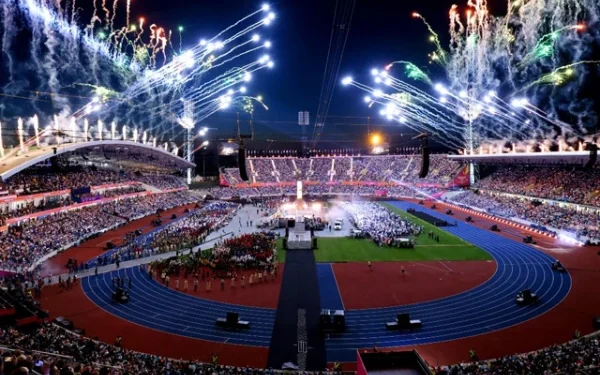India has officially announced its bid to host the 2030 Commonwealth Games (CWG), signaling a bold move in the country’s journey toward becoming a global sports destination. The announcement not only revives memories of the 2010 New Delhi Games but also reflects India’s long-term vision of hosting the 2036 Olympic Games.
Indian Olympic Association (IOA) President PT Usha, herself a legendary Olympian, confirmed the development after a high-level meeting. She assured that preparations would proceed at “full speed”, underlining India’s determination to showcase its ability to host world-class sporting events on a massive scale.
India’s Growing Sports Ambitions
India’s decision to bid for the 2030 CWG cannot be viewed in isolation. It is part of a broader strategic plan:
- Positioning as a Sports Hub: With a growing sports economy, expanding infrastructure, and global fan base, India wants to cement its place as a leading host nation.
- 2036 Olympics Vision: Last year, India submitted a formal letter of intent to the International Olympic Committee (IOC) to host the 2036 Olympic Games. Hosting the Commonwealth Games first would serve as a testing ground for organizational readiness.
- Global Sports Diplomacy: For the government, mega sports events are not just about athletics but also about soft power, diplomacy, and international visibility.
Possible Host Cities
While the final decision on the host city remains pending, several contenders have emerged:
1. New Delhi
- Hosted the 2010 Commonwealth Games.
- Boasts existing infrastructure such as the Jawaharlal Nehru Stadium.
- However, the 2010 event was marred by delays, corruption allegations, and criticism of poor facilities, leaving a mixed legacy.
- Hosting again could allow New Delhi to redeem its image by demonstrating improved capabilities.
2. Ahmedabad, Gujarat
- Home to the Narendra Modi Stadium, the world’s largest cricket venue with a capacity of 130,000 spectators.
- Hosted the 2023 Cricket World Cup final, proving its readiness for mega events.
- Strong political backing, as it lies in Prime Minister Narendra Modi’s home state, may give it an edge.
3. Bhubaneswar, Odisha
- Known as India’s “sports capital” in recent years.
- Successfully hosted the Hockey World Cup (2018 & 2023) and several athletics championships.
- Backed by Odisha’s consistent investment in sports infrastructure and athlete development programs.
The final choice could depend on factors such as international perception, logistical readiness, and political consensus.
Commonwealth Games 2010: Lessons from the Past
India last hosted the CWG in 2010, but the event became infamous for:
- Infrastructure delays
- Cost overruns
- Allegations of corruption
- Unfinished facilities and substandard arrangements
The controversy dented India’s image on the global stage. However, it also left behind a legacy of infrastructure—stadiums, training facilities, and sports villages—which could be revitalized and reused.
By bidding for 2030, India appears ready to rewrite the narrative, demonstrating that lessons have been learned and higher standards will be maintained.
Competition for the 2030 Host
India is not the only nation eyeing the 2030 CWG. According to media reports, at least three countries, including Nigeria, have shown interest.
Why is Hosting Difficult?
- The CWG has faced financial challenges in recent years.
- The Australian state of Victoria withdrew from hosting the 2026 Games, citing escalating costs.
- As a result, Glasgow (Scotland) stepped in to host a scaled-down version of the event.
Against this backdrop, India’s bid stands out because it promises a full-scale Games, not a reduced event.
India’s Sporting Prospects in CWG 2030
India has traditionally performed well at the Commonwealth Games, where competition is relatively less intense compared to the Olympics.
Medal Hopes
- Weightlifting, Wrestling, Badminton, and Boxing have been India’s strongholds.
- Emerging talents in athletics, table tennis, and shooting are also expected to boost the medal tally.
Traditional Sports Push
A unique aspect of India’s bid is the proposal to include indigenous sports such as kabaddi and kho kho.
- These games are deeply rooted in Indian culture.
- Their inclusion would not only boost India’s medal chances but also globalize traditional sports, paving the way for possible future Olympic recognition.
Olympic Context
Despite being the world’s most populous country, India has won only 10 gold medals in Olympic history, a statistic considered underwhelming. Success at the Commonwealth Games could act as a confidence-building platform ahead of the 2036 Olympics bid.
The Road Ahead: Bidding Process
The process for securing the 2030 CWG involves several stages:
- Formal Submission: India must submit its detailed bid by August.
- Evaluation: The Commonwealth Games Federation (CGF) will assess proposals on infrastructure, financing, security, and legacy plans.
- Final Decision: A decision is expected at the CGF meeting in Glasgow in November 2025.
If successful, India will have five years to prepare, giving it sufficient time to upgrade infrastructure and ensure flawless execution.
Broader Benefits of Hosting the Games
Hosting the CWG would bring multiple benefits for India:
- Economic Impact: Boost to tourism, hospitality, and local businesses.
- Employment Generation: Construction and event management jobs.
- Urban Development: Infrastructure upgrades in host cities.
- Sports Growth: Encouragement for grassroots participation and athlete training.
- International Image: Positioning India as a reliable global host.
While challenges exist—such as managing costs, avoiding corruption, and ensuring sustainability—India’s strong political will and growing economy provide a solid foundation.
Challenges India Must Address
To avoid repeating the 2010 mistakes, India must tackle several challenges head-on:
- Transparency in Spending: Strict monitoring to prevent corruption.
- On-time Completion: Avoiding delays in stadium construction and infrastructure projects.
- Athlete-Centric Approach: Ensuring facilities meet international standards.
- Sustainability: Focusing on eco-friendly games with long-term utility of venues.
- Public Support: Balancing public opinion, especially criticism of spending large sums on sports while social needs exist.
International Reactions and Significance
India’s bid has attracted global attention. For the Commonwealth Games Federation, India’s interest is a welcome development at a time when the CWG faces uncertainty due to financial and organizational setbacks.
For India, hosting the event would be more than just a sports competition. It would:
- Enhance its international profile.
- Strengthen its case for hosting the Olympics in 2036.
- Serve as a platform to showcase modern infrastructure, organizational capacity, and cultural diversity.
Conclusion
India’s bid to host the 2030 Commonwealth Games represents a watershed moment in its sporting journey. With cities like New Delhi, Ahmedabad, and Bhubaneswar in contention, and with the support of the Indian Olympic Association and government, the bid reflects both ambition and determination.
If successful, the Games would not only provide India with an opportunity to redeem its image after 2010 but also prepare the nation for the ultimate prize—the 2036 Olympic Games.
As IOA member Rohit Rajpal aptly stated, India’s vision is to host a complete sports event, including indigenous games, where the country can shine. In doing so, India hopes to prove that it is ready to take its place among the world’s great sporting nations.

























